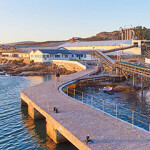NGOs claim overfishing remains a critical problem in Europe

Overfishing continues to proliferate in European waters, including in lucrative Northeast Atlantic fisheries, despite E.U. laws that have stated to eliminate the practice, according to NGOs Oceana, Seas At Risk, and ClientEarth.
With a number of important fisheries negotiations set for the end of the year, these organizations are urging fisheries ministers to align management practices with scientific advice and set future catch limits that are sustainable for the health of essential fish stocks.
Speaking at a media briefing held on 20 November, Oceana Europe’s Campaign Director for Sustainable Fisheries Javier López said that more than 25 fish populations in the Northeast Atlantic, including species like cod, herring, mackerel, nephrops, and eels, are in a “critical state of conservation.”
“NGO analysis and official reports from European administrations confirm that progress toward ending overfishing has been insufficient and too slow for both the European Union and the U.K. to meet legal obligations,” López said.
The analysis concluded that 34 percent of U.K. fish stocks are subject to overfishing, 60 percent of the country’s total allowable catch (TAC) thresholds are set above levels recommended by expert scientific guidance, and 26 percent of Northeast Atlantic fish stocks that are under maximum sustainable yield (MSY) advice are also subject to overfishing.
“While these reports are different in scope and methodology, the common conclusion from them is that three years after the legal 2020 deadline to end overfishing, Northeast Atlantic countries are still setting catch limits that are above scientific advice,” López said. “A number of fish populations remain at a very low fraction of what is considered sustainable … We are suggesting that over 25 fish populations should be [subject to] no fishing with zero TAC.”
As for the 2020 deadline, López referenced a legal target set in 2013 as the overarching objective of the bloc’s Common Fisheries Policy to end overfishing by 2020 at the latest, but instead, the overfishing of already depleted stocks has continued.
A number of pelagic stocks, such as blue whiting, Atlanto-Scandian herring, and Northeast Atlantic mackerel have lost sustainability certifications as a consequence of the persistent overfishing. Organizations like the industry-led North Atlantic Pelagic Advocacy Group and the Marine Stewardship Council have urged “tangible action” on the problem, and while coastal states have reached agreements on quotas for species within scientific advice in 2023, similar agreements were reached in 2022 and 2021 – but subsequent negotiations ended up in overfishing anyway.
Besides setting limits that disregard scientific advice, the NGOs said many fishing operations occur in mixed fisheries where it’s common for at-risk species to be caught in tandem with more abundant target fish. In these situations, Oceana recommends returning vulnerable stock to safe levels is a priority above all else.
If the E.U. is going to accomplish that goal, decision-makers need to consider anthropogenic pressures and environmental conditions that influence the status of depleted stocks and couple these efforts with robust, full-catch documentation, such as onboard observers or remote electronic monitoring (REM), López said.
“By implementing these recommendations, European countries will not only bring these stocks back from the brink, but they’ll also fulfill their obligations to exploit all fish stocks in a sustainable way,” he said.
Seas At Risk Fisheries Policy Officer Remi Cossetti said that in addition to contributing toward the depletion of fish populations, overfishing also undermines the crucial role of fish in marine ecosystems, including their pivotal role in the “ocean biological carbon pump,” which captures and stores much of the excess carbon in the atmosphere.
Fishing on depleted stocks requires more fuel than fishing on abundant stocks, he said, as fewer fish in the ocean forces fishers to search longer, travel farther out, and use heavier and more damaging fishing gear.
Therefore, this harmful practice exacerbates the climate crisis, he said.
“The larger the fish biomass, the greater the ocean’s ability to sequester carbon. Also, the bigger the fish population is, the more resilient it is to future shocks such as climate change or diseases,” he said. “Basically, restoring fish populations will lead to healthier and more climate-resilient ecosystems, which will be an asset to fishers – enabling them to catch more fish sustainably.”
To properly combat overfishing and climate change, Seas At Risk wants coastal nations to ...
Photo courtesy of shocky/Shutterstock




Share